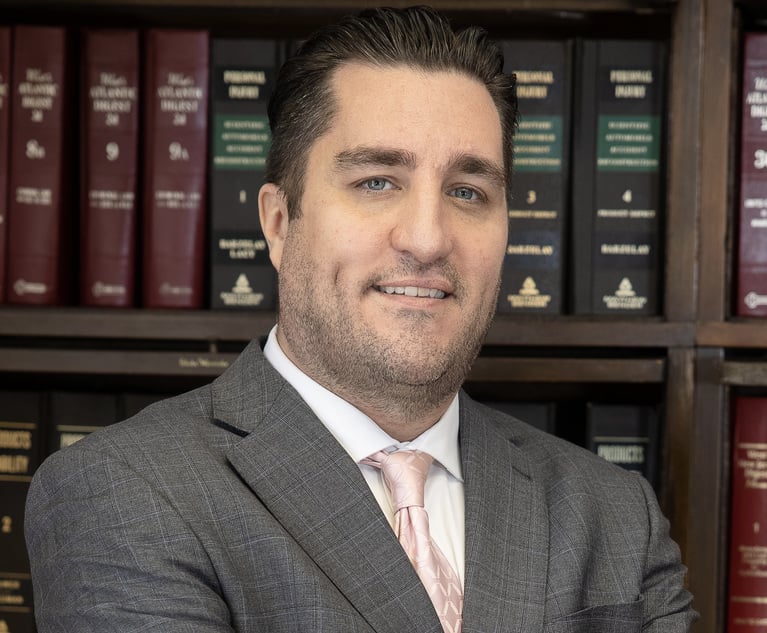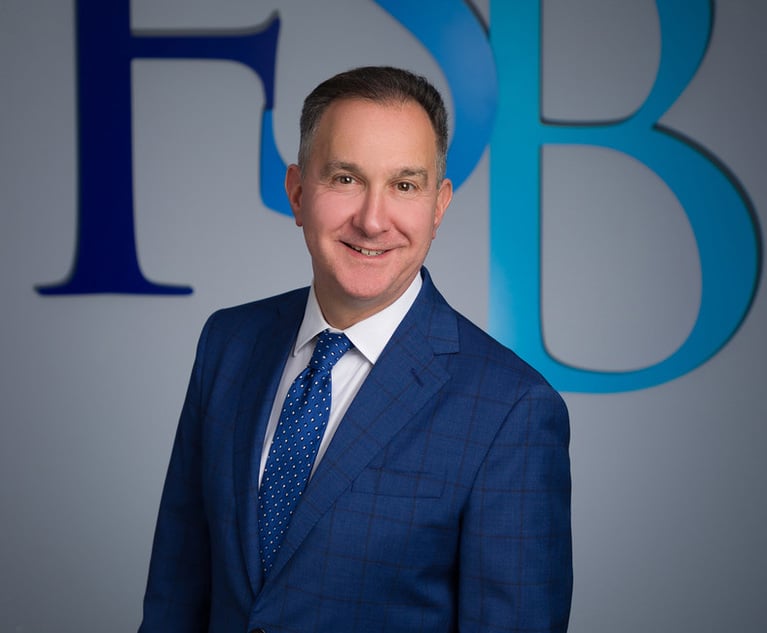 Hughes Justice Complex, Trenton, NJ. Photo: Carmen Natale/ALM
Hughes Justice Complex, Trenton, NJ. Photo: Carmen Natale/ALM State High Court: Coach's Supervisory Role During Athlete's Warm-Up Injury Governed by 'Simple Negligence Standard'
"We granted certification, and now reject Fillmyer's contention that she was entitled to the application of a recklessness standard in these circumstances, a position supported by the New Jersey Civil Justice Institute as amicus curiae," wrote Judge Clarkson S. Fisher, who was temporarily assigned to the New Jersey Supreme Court.
October 26, 2022 at 02:39 PM
7 minute read
In its first opinion published since August, the New Jersey Supreme Court weighed whether a high-school coach's alleged acts and omissions pertaining to an athlete's injuries are governed by the simple negligence standard or the heightened standard of recklessness applied in Crawn v. Campo, according to the opinion.
Judge Clarkson S. Fisher, who was temporarily assigned to the New Jersey Supreme Court on Aug. 15, delivered the opinion. Fisher will return to the appellate division but continues to participate in matters that went before the state high court prior to the Oct. 21 order date.
Morgan Dennehy, a then-17-year-old high school field hockey player for Hightstown High School, was injured at practice on Sept. 9, 2015. Field hockey practice was scheduled for 3:45 p.m. on a turf field, but the field was occupied by the boys' soccer team until 3:45 p.m. Around 3 p.m., the field hockey coach, Dezarae Fillmyer, instructed the offensive players to warm up in the area between athletic fields.
During the warm-up, Dennehy claimed she was struck at the base of her skull with a soccer ball, which caused injuries. Dennehy asserted claims against the East Windsor Regional Board of Education, Hightstown High School, and three individuals, including Fillmyer. Dennehy alleged that her injuries were sustained from the defendants' "failure to supervise; prevent potential and foreseeable dangerous conditions; provide appropriate safeguards; and post suitable warnings of potentially dangerous conditions," according to the opinion.
The defendants moved for summary judgment, which was granted by the trial court. The trial court held that Dennehy was required to show the defendants' acts or omissions rose to the degree of recklessness described in prior New Jersey Supreme Court cases, Crawn and Schick v. Ferolito, the opinion said.
In Crawn, the court concluded that "'the duty of care applicable to participants in informal recreational sports is to avoid the infliction of injury caused by reckless or intentional conduct," while the court said in Schick that "the heightened standard in recreational sports should not depend on which sport is involved and whether it is commonly perceived as a 'contact' or 'noncontact' sport,'" the opinion cited.
"Applying that heightened standard, the trial judge determined that the allegations could not support a claim of intentional or reckless conduct," Fisher wrote.
Dennehy appealed and challenged the trial court's determination that the recklessness standard applied to Fillmyer's alleged acts and omissions. The appellate division reversed the trial court ruling, holding that the simple negligence standard applied because Fillmyer was "not a co-participant" and because Dennehy's claim was that she failed to "supervise and oversee the participants of the sport," according to the opinion.
"We granted certification, and now reject Fillmyer's contention that she was entitled to the application of a recklessness standard in these circumstances, a position supported by the New Jersey Civil Justice Institute as amicus curiae," stated Fisher. "We instead agree with plaintiff's argument, which the New Jersey Association for Justice similarly urges, that her claims should be governed by a simple negligence standard."
Dennehy alleged tortious conduct by Fillmyer in her choice of location for the "impromptu workout" before the actual practice began and for her alleged failure to supervise players as they waited to practice on the turf field. Fillmyer argued that the recklessness standard in Crawn "should be extended to apply to acts and omissions of instructors and coaches like herself regardless of the circumstances."
"Our case law has not focused on a coach or instructor actively participating in the sporting activity when the injury occurred. Nor do we accept the invitation here to opine broadly on the circumstances that may generate liability for coaches or instructors or to ascertain when their acts or omissions should be assessed by a standard other than simple negligence," Fisher wrote. "We choose instead to define the standard that applied to Fillmyer under the limits of the allegations presented by plaintiff, and we leave for another time the fixing of appropriate standards to govern the myriad ways in which the multi-faceted roles played by coaches and instructors may cause an injury to a participant."
The court found that the circumstances in the present case do not align with those presented in Rosiana v. Carmona, in which a karate instructor injured a student while sparring. In that circumstance, the heightened standard was applied, according to Fisher.
"Even if Fillmyer was actively participating in the practice when plaintiff was injured, it is clear from the record that plaintiff was not injured by a batted field hockey ball, an errant swing of a field hockey stick, or any other activity associated with that sport," stated Fisher. "Plaintiff was struck by a soccer ball that came from another field. That undisputed fact further demonstrates that plaintiff's claim is based only on Fillmyer's supervisory role in selecting the timing and location of the team's informal practice."
Neither Crawn, nor Schick support the application of a recklessness standard to Fillmyer's choice of "whether, where, and when plaintiff and her teammates were to participate in drills prior to the practice scheduled by the athletic director," the opinion said.
"Indeed, the essence of plaintiff's theory of liability—that Fillmyer chose the wrong place and an unpropitious time to commence practice—is no different than the decisions that might be made by a biology teacher taking a class out to study marine life at the beach," stated Fisher. "In these and other similar settings, parents have the right to expect that teachers and coaches will exercise reasonable care when in charge of their children and that courts will not immunize a teacher's negligence by imposing a higher standard of care."
Fisher stated that as the court observed in Crawn, imposing a higher standard of care essentially immunizes all conduct that falls below that standard.
The state high court affirmed the appellate division decision and remanded to trial court for further proceedings. Chief Justice Stuart Rabner, Justice Anne M. Patterson, Justice Lee Solomon, Justice Fabiana Pierre-Louis, Justice Douglas M. Fasciale, and Judge Jack M. Sabatino, temporarily assigned, joined in Fisher's opinion.
"My client and I thank the Supreme Court for providing much-needed clarity on this important legal issue that has been the subject of appellate dispute for many years," said counsel for Dennehy, Brian A. Heyesey of Szaferman, Lakind, Blumstein & Blader.
"In affirming the Appellate Division's holding, the Court reinforces that Crawn's heightened standard only applies to claims against someone who causes injury while actively participating in a recreational sports activity, not to claims based on a coach's negligent supervision of a player the coach was charged with instructing," said Heyesey. "The holding sends a clear message that any attempt to immunize the tortious conduct of a coach, specifically a coach who is not engaged as a co-participant in the recreational sports activity itself, will fly in the face of the well-established duty of school personnel to exercise reasonable supervisory care for the safety of students entrusted to them."
"All parents should be reassured by this holding," stated Heyesey.
A message seeking comment was not immediately returned from Timothy P. Beck of DiFrancesco, Bateman, Kunzman, Davis, Lehrer & Flaum, on behalf of Fillmyer and the other appellants.
NOT FOR REPRINT
© 2024 ALM Global, LLC, All Rights Reserved. Request academic re-use from www.copyright.com. All other uses, submit a request to [email protected]. For more information visit Asset & Logo Licensing.
You Might Like
View All

'Go 12 Rounds' or Settle: Rear-End Collision Leads to $2.25M Presuit Settlement

Hit by Mail Truck: Man Agrees to $1.85M Settlement for Spinal Injuries

Construction Worker Hit by Falling Concrete Settles Claims for $2.3M
4 minute readTrending Stories
- 1Jimmy Carter’s 1974 Law Day Speech: A Call for Lawyers to Do the Public Good
- 2Second Circuit Upholds $5M Judgment Against Trump in E. Jean Carroll Case
- 3Clifford Chance Hikes Partner Pay as UK Firms Fight to Stay Competitive on Compensation
- 4Judicial Conduct Watchdog Opposes Supreme Court Justice's Bid to Withdraw Appeal of Her Removal
- 5Lessons in Mediation & Negotiation: Attorneys' Reflections on Jimmy Carter
Who Got The Work
Michael G. Bongiorno, Andrew Scott Dulberg and Elizabeth E. Driscoll from Wilmer Cutler Pickering Hale and Dorr have stepped in to represent Symbotic Inc., an A.I.-enabled technology platform that focuses on increasing supply chain efficiency, and other defendants in a pending shareholder derivative lawsuit. The case, filed Oct. 2 in Massachusetts District Court by the Brown Law Firm on behalf of Stephen Austen, accuses certain officers and directors of misleading investors in regard to Symbotic's potential for margin growth by failing to disclose that the company was not equipped to timely deploy its systems or manage expenses through project delays. The case, assigned to U.S. District Judge Nathaniel M. Gorton, is 1:24-cv-12522, Austen v. Cohen et al.
Who Got The Work
Edmund Polubinski and Marie Killmond of Davis Polk & Wardwell have entered appearances for data platform software development company MongoDB and other defendants in a pending shareholder derivative lawsuit. The action, filed Oct. 7 in New York Southern District Court by the Brown Law Firm, accuses the company's directors and/or officers of falsely expressing confidence in the company’s restructuring of its sales incentive plan and downplaying the severity of decreases in its upfront commitments. The case is 1:24-cv-07594, Roy v. Ittycheria et al.
Who Got The Work
Amy O. Bruchs and Kurt F. Ellison of Michael Best & Friedrich have entered appearances for Epic Systems Corp. in a pending employment discrimination lawsuit. The suit was filed Sept. 7 in Wisconsin Western District Court by Levine Eisberner LLC and Siri & Glimstad on behalf of a project manager who claims that he was wrongfully terminated after applying for a religious exemption to the defendant's COVID-19 vaccine mandate. The case, assigned to U.S. Magistrate Judge Anita Marie Boor, is 3:24-cv-00630, Secker, Nathan v. Epic Systems Corporation.
Who Got The Work
David X. Sullivan, Thomas J. Finn and Gregory A. Hall from McCarter & English have entered appearances for Sunrun Installation Services in a pending civil rights lawsuit. The complaint was filed Sept. 4 in Connecticut District Court by attorney Robert M. Berke on behalf of former employee George Edward Steins, who was arrested and charged with employing an unregistered home improvement salesperson. The complaint alleges that had Sunrun informed the Connecticut Department of Consumer Protection that the plaintiff's employment had ended in 2017 and that he no longer held Sunrun's home improvement contractor license, he would not have been hit with charges, which were dismissed in May 2024. The case, assigned to U.S. District Judge Jeffrey A. Meyer, is 3:24-cv-01423, Steins v. Sunrun, Inc. et al.
Who Got The Work
Greenberg Traurig shareholder Joshua L. Raskin has entered an appearance for boohoo.com UK Ltd. in a pending patent infringement lawsuit. The suit, filed Sept. 3 in Texas Eastern District Court by Rozier Hardt McDonough on behalf of Alto Dynamics, asserts five patents related to an online shopping platform. The case, assigned to U.S. District Judge Rodney Gilstrap, is 2:24-cv-00719, Alto Dynamics, LLC v. boohoo.com UK Limited.
Featured Firms
Law Offices of Gary Martin Hays & Associates, P.C.
(470) 294-1674
Law Offices of Mark E. Salomone
(857) 444-6468
Smith & Hassler
(713) 739-1250






